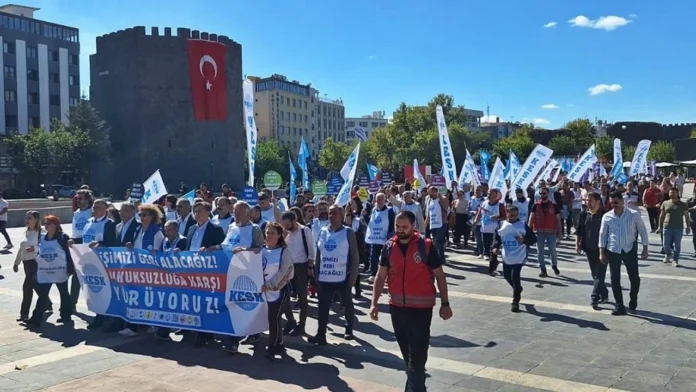The Confederation of Public Employee Trade Unions (KESK) on Monday began a five-day march calling for the reinstatement of civil servants fired by emergency decrees following a 2016 coup attempt in Turkey, the Bold Medya news website reported.
The march, under the banner “We March for Justice, Equality and Our Jobs,” will pass through the provinces of Diyarbakır, Şanlıurfa, Adıyaman, Gaziantep, Adana, Mersin and Ankara. In each province KESK has organized meetings bringing together labor union members, dismissed civil servants and local NGOs. The march is scheduled to conclude on October 17 in front of the Turkish Parliament in Ankara.
On Tuesday the Adıyaman meeting was attended by KESK Co-Chairs Ayfer Koçak and Ahmet Karagöz, union leaders affiliated with the confederation and representatives from the Peoples’ Equality and Democracy Party (DEM Party), the Democratic Regions Party (DBP), the Pir Sultan Abdal Association and local civil society organizations.
According to KESK of the civil servants dismissed during the post-coup purge, 4,259 were KESK members. Nearly half have been reinstated, though some were returned to their jobs posthumously.
In the aftermath of the abortive putsch on July 15, 2016, the Turkish government declared a state of emergency that remained in effect until July 19, 2018 and carried out a massive purge of state institutions under the pretext of an anti-coup fight. More than 127,000 people were summarily dismissed from the civil service. Fewer than 20,000 have been reinstated.
The post-coup crackdown mainly targeted followers of the Gülen movement, a faith-based group inspired by the late Muslim cleric Fethullah Gülen.
Turkish President Recep Tayyip Erdoğan has been targeting followers of the Gülen movement, inspired by the late Muslim cleric Fethullah Gülen, since corruption investigations in December 2013 implicated him as well as some members of his family and inner circle.
Dismissing the investigations as a Gülenist coup and a conspiracy against his government, Erdoğan began to target the movement’s members. He designated the movement as a terrorist organization in May 2016 and intensified the crackdown on it following the abortive putsch in July of the same year that he accused Gülen of masterminding. The movement strongly denies involvement in the coup attempt or any terrorist activity.
Former civil servants were not only fired from their jobs; they were also banned from working again in the public sector and getting a passport. The government also made it difficult for them to work formally in the private sector, with notes put on the social security database about dismissed public servants to deter potential employers.
The European Court of Human Rights (ECtHR) has issued multiple rulings faulting Turkey’s handling of post-coup purges, but implementation has been limited.















